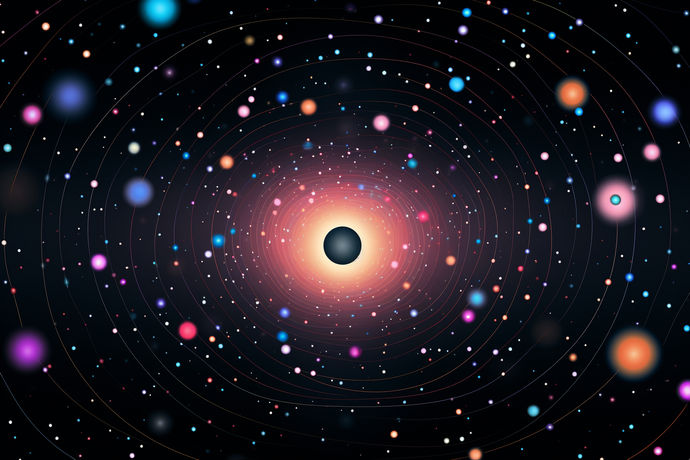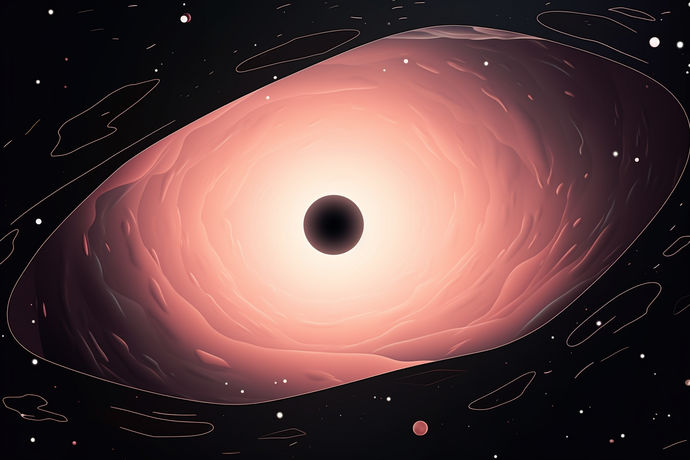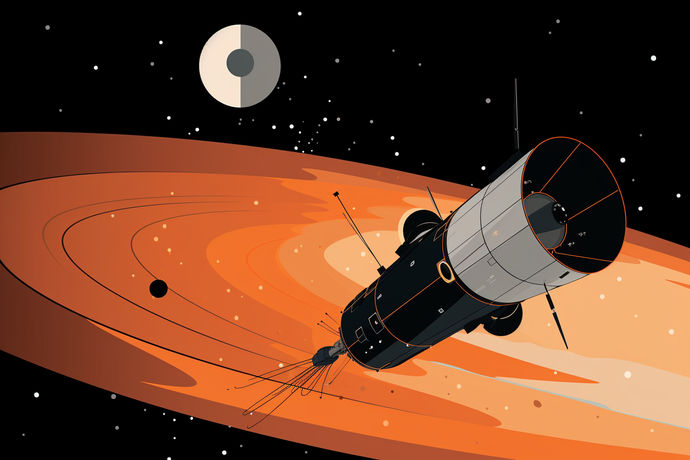Black Holes
Black Holes are regions of extreme gravity, formed from collapsed stars, that trap everything including light, with an event horizon marking the point of no return and a singularity at their core.
#TLDR
- Black holes are areas in space with extreme gravity that traps everything, including light, formed from collapsed massive stars.
- The event horizon is the boundary of a black hole, marking the irreversible point where anything crosses it gets sucked in.
- A singularity, a point of infinite density where known physics laws fail, exists inside a black hole.
- Black holes are indirectly observable through their impact on nearby matter and light, like influencing star orbits or bending light rays.
- The size of a black hole, known as the Schwarzschild radius, is directly proportional to its mass, with larger mass resulting in a larger black hole.
- 🌌Formation of Black Holes: Black holes are formed from the remnants of massive stars. When such a star has exhausted the nuclear fuel, it undergoes a violent explosion (supernova) and collapses under its own gravity, forming a black hole.
- 🌀Event Horizon Explained: The event horizon is the point of no return around a black hole. Once anything, including light, crosses this boundary, it cannot escape the black hole's gravitational pull and is forever lost to the universe.
- 🔮Singularity and Its Mystery: At the heart of a black hole lies the singularity, a point where gravity is so intense that spacetime curves infinitely and the laws of physics as we know them cease to apply. This remains one of the greatest mysteries in our understanding of the universe.
- 🌠Hawking Radiation Phenomenon: Proposed by physicist Stephen Hawking, Hawking radiation is theoretical radiation that is predicted to be emitted by black holes. This phenomenon suggests that black holes are not completely black, but emit small amounts of thermal radiation due to quantum effects near the event horizon.
- ⏳Black Holes and Time: The intense gravitational pull of a black hole can warp spacetime around it. This leads to the fascinating and mind-bending concept of time dilation, where time near a black hole moves slower compared to time further away.
- 🔭Detecting Black Holes: Black holes cannot be directly observed due to their strong gravity pulling in all light. However, their presence can be inferred by observing their effects on nearby matter, such as stars orbiting an invisible object, or light being bent as it passes near a black hole.
- 🌑Supermassive Black Holes: These are the largest type of black holes, millions or even billions of times the mass of our sun. They reside at the center of most galaxies, including our own Milky Way, and play a crucial role in the evolution of galaxies.
- 🎥Black Holes in Pop Culture: Black holes have been a popular subject in science fiction and movies. They are often depicted as portals to other universes or times, although these depictions are usually not scientifically accurate.

Interesting & Controversial
A Micro Black Hole Amidst Quantum Particles. (AI generated image)
- 🧩Black Hole Paradox: The Black Hole Information Paradox, proposed by Stephen Hawking, suggests that all information about matter entering a black hole is lost forever. This contradicts the principles of quantum mechanics, which state that information can never be completely destroyed. This paradox has puzzled scientists for decades and remains unresolved.
- 🔬Micro Black Holes: Contrary to popular belief, black holes don't have to be massive. Micro black holes, also known as quantum black holes, could theoretically exist at the quantum level. If they do exist, they could provide a link between quantum mechanics and general relativity, two theories that are currently incompatible.
- 🔥Black Hole Firewall: The firewall paradox suggests that a 'firewall' of high-energy particles exists at the event horizon of a black hole, incinerating anything that falls in. This contradicts the theory of general relativity, which predicts a smooth, uneventful entry into a black hole. This controversial idea has sparked intense debate among physicists.
- ⏰Time Travel Possibility: The intense gravitational pull of black holes could theoretically warp spacetime enough to create 'wormholes'. These could potentially allow for faster-than-light travel or even time travel. However, the existence of wormholes remains purely theoretical and unproven.
- 🌌Black Holes and Dark Matter: Some scientists speculate that primordial black holes, formed in the early universe, could make up a significant portion of the mysterious dark matter. While this is an intriguing idea, there is currently no conclusive evidence to support this theory.
- 📝Black Hole Information Loss: The concept of black hole information loss suggests that when matter falls into a black hole, all information about its original state is lost. This is a controversial idea, as it contradicts the laws of quantum mechanics, which state that information can never be completely destroyed.
- 🌑Primordial Black Holes: Primordial black holes are a hypothetical type of black hole that formed soon after the Big Bang. Unlike stellar black holes, they could be of any size, not just the size of a star. If they exist, they could provide valuable insights into the early universe.
- 💥Black Hole Mergers: When two black holes merge, they create gravitational waves - ripples in the fabric of spacetime. These mergers are incredibly powerful events, releasing more energy than all the stars in the observable universe combined. The detection of these waves has opened up a new way of observing the universe.

Interesting facts
Gravitational lensing by a black hole. (AI generated image)
- 🌌The first black hole wasn't discovered until X-1 in Cygnus, a binary star system, was studied in the 1960s.
- 🌠The nearest known black hole to Earth, named V616 Monocerotis, is located about 3,000 light years away.
- 🎆The term 'black hole' was coined by physicist John Archibald Wheeler in 1967.
- 🌚Black holes can spin at close to the speed of light, creating a powerful centrifugal force.
- 🌟The largest known supermassive black hole, TON 618, has a mass of approximately 66 billion suns.
- 🌈Due to gravitational lensing, a black hole can appear as a distorted, magnified, or multiplied image of a distant star.
- 🕳️If our Sun were replaced with a black hole of the same mass, Earth's orbit would remain unchanged.
- 🎇The center of our galaxy, the Milky Way, is thought to contain a supermassive black hole known as Sagittarius A*.

Myth Busting
Spaghettification of a Spacecraft by a Black Hole (AI generated image)
- 🌀Myth: Black Holes as Vacuums — Contrary to popular belief, black holes do not act like cosmic vacuums, indiscriminately sucking up everything in their vicinity. Instead, objects need to be very close to a black hole to be drawn in, much like how planets need to be close to a star to be affected by its gravity.
- 📏Myth: Infinite Black Hole Size — While black holes are incredibly dense, they are not infinitely large. The size of a black hole, as defined by its event horizon, is directly proportional to its mass. Therefore, a black hole's size can be finite and vary greatly.
- 👀Myth: Visible Black Hole Appearance — Black holes themselves are not visible because they do not emit or reflect light. However, their strong gravitational pull can distort the light from nearby stars and gas, creating a visible accretion disk around the black hole.
- 💀Myth: Instant Death by Black Holes — While getting too close to a black hole would indeed be deadly due to intense gravity and tidal forces, it wouldn't cause instant death. Instead, you would experience 'spaghettification', where gravitational forces stretch you into a long, thin shape before you cross the event horizon.
FAQ
How are black holes named?
Black holes are typically named after the constellation in which they are found, along with a designation indicating their order of discovery. For example, Cygnus X-1 was the first X-ray source discovered in the constellation Cygnus.
Can black holes collide?
Yes, black holes can collide. When they do, they merge to form a larger black hole, releasing energy in the form of gravitational waves, which were first detected by the LIGO experiment in 2015.
What happens inside a black hole?
The interior of a black hole is a region of extremely high density known as a singularity. According to general relativity, space and time as we understand them cease to exist inside a singularity. However, the exact nature of what happens inside a black hole remains a topic of ongoing research.
Are black holes always circular?
Black holes are not always perfectly circular. They can be distorted, especially when they are rotating or if they have recently absorbed mass. However, a non-rotating, isolated black hole would be perfectly spherical according to general relativity.
Can black holes evaporate?
According to a theory proposed by physicist Stephen Hawking, black holes can slowly lose energy and mass over time through a process known as Hawking radiation. This could eventually lead to the evaporation of the black hole, although this process would take an incredibly long time for a typical black hole.
How many black holes exist?
The exact number of black holes in the universe is unknown, as they are difficult to detect. However, astronomers estimate that our Milky Way galaxy alone contains about 100 million stellar black holes. There are also supermassive black holes at the centers of most galaxies, including our own.